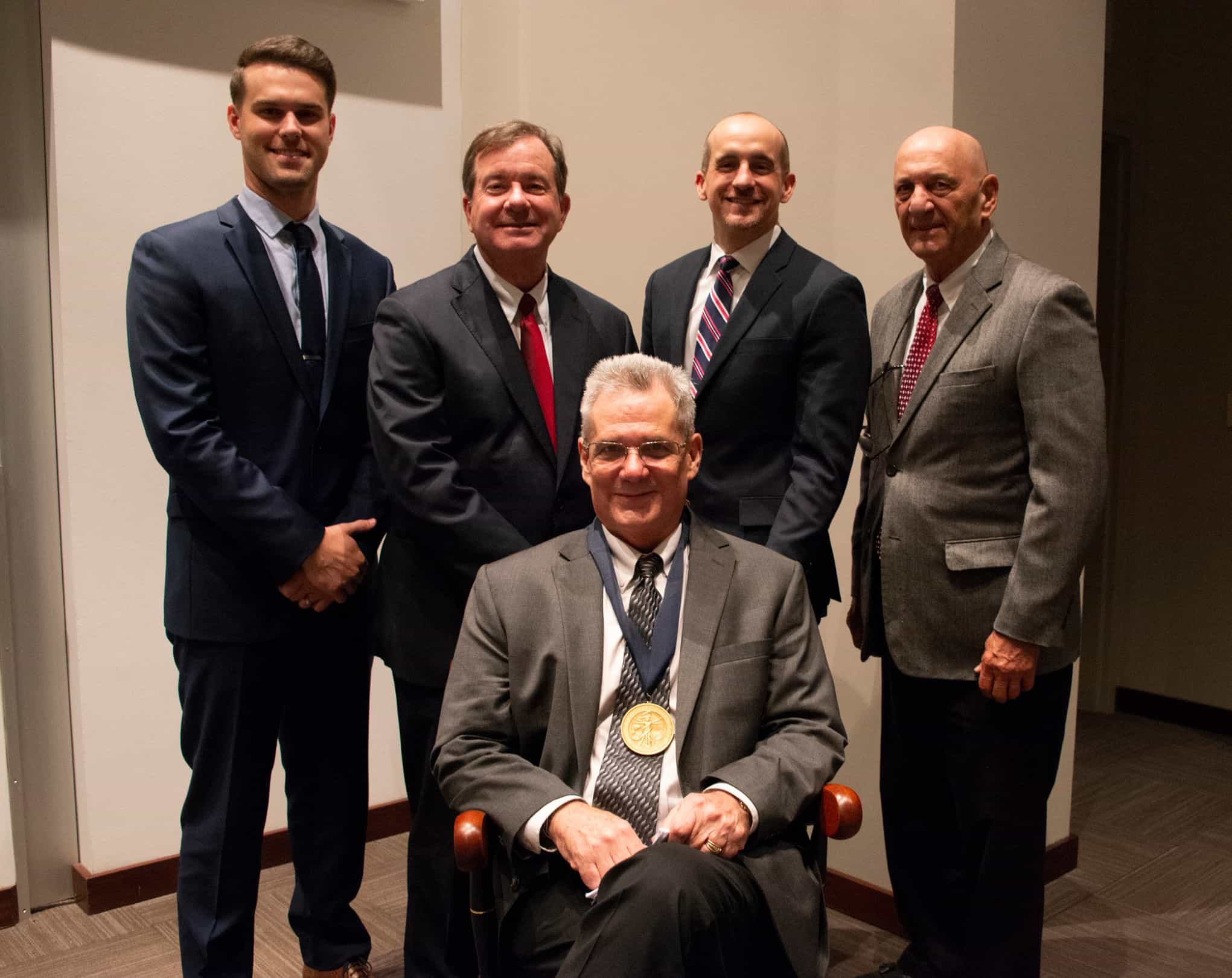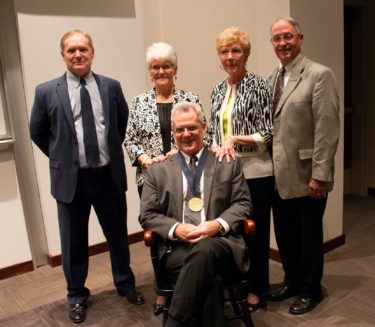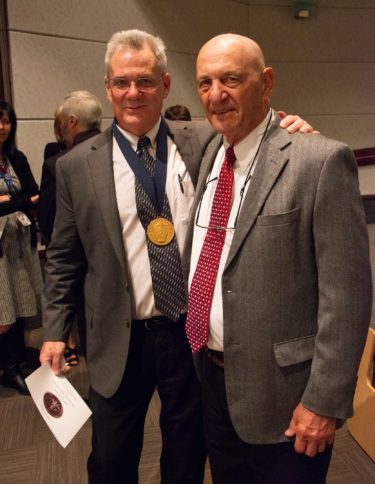View Larger Image

Smeltzer poses with (from left) Daniel G. Meeker, Ph.D.; C. Lowry Barnes, M.D.; James E. Cassat, M.D., Ph.D.; and John J. Iandolo, Ph.D.
Image by Sam Giannavola
Mark Smeltzer, Ph.D., Invested in Chair in Sciences Basic to Medicine
| Mark Smeltzer, Ph.D., professor in the Department of Microbiology & Immunology and the Department of Orthopaedic Surgery in the College of Medicine at the University of Arkansas for Medical Sciences (UAMS), was invested Oct. 28 in the Chair in Sciences Basic to Medicine.

“This award is really special to me because I am a basic scientist, but I want my science to be relevant and important to people, and to medicine,” said Smeltzer.Sam Giannavola
Smeltzer, who studies Staphylococcus aureus, is one of the most well-funded faculty in the UAMS College of Medicine and has received numerous teaching and research awards.
“This award is really special to me because I am a basic scientist, but I want my science to be relevant and important to people, and to medicine,” said Smeltzer. “But what makes this award even more special is that it’s being given to me by the University of Arkansas for Medical Sciences. I’m now in my 27th year here, and I’m doing everything in my power to make UAMS proud.”
An endowed chair is among the highest academic honors a university can bestow on a faculty member. A chair is established with gifts of at least $1 million, which are invested and the interest proceeds used to support the educational, research and clinical activities of the chair holder. Those named to a chair are among the most highly regarded scientists, physicians and professors in their fields.
“This well-deserved honor for Dr. Smeltzer is about both the past and the future,” said UAMS Chancellor Cam Patterson, M.D., MBA. “Mark Smeltzer is a distinguished scientist who is deeply invested in educating additional scholars to follow in his footsteps. We are all proud of your contributions to UAMS and to biomedical science.”
Smeltzer has been continuously funded by the National Institute of Allergy and Infectious Disease (NIAID) since 1996 and by the Department of Defense since 2009. He also serves as director of the Center for Microbial Pathogenesis and Host Inflammatory responses, which has been funded to date by a 10-year, $21.2 million award from the National Institute of General Medical Sciences.

Smeltzer with (from left) his brother, Ron; mother, Betty; aunt Pat Ezell and uncle Hack Ezell.Sam Giannavola
According to the Blue Ridge Institute for Medical Research, Smeltzer’s funding ranks 42nd among 1,040 microbiology researchers at U.S. medical schools.
“Dr. Smeltzer is one of our most successful researchers on campus and in microbiology nationally, and his work has impacted multiple fields, including orthopaedics and cancer,” said Christopher T. Westfall, M.D., UAMS executive vice chancellor and dean of the College of Medicine. “He is also an accomplished and respected teacher and mentor, and has helped train the next generation of scientists at UAMS.”
Smeltzer was presented with a commemorative medallion by Patterson and Westfall. He thanked his students and colleagues and recognized several members of his family who were in attendance.
Smeltzer, who joined UAMS in 1993, has pursued many avenues in his research including improved diagnostic methods, enhanced antibiotic delivery, alternative treatment methods including nanotechnology, and understanding the molecular basis for the prominence of S. aureus as an orthopaedic pathogen.
“Dr. Smeltzer was happy to help me succeed in his lab or in someone else’s,” said Daniel G. Meeker, Ph.D., a College of Medicine M.D. candidate in the Class of 2020. “He is a great mentor to students even before they become his students. Today I want him to take pride in his accomplishments, as I express my pride in him.”

“I first met Mark when he was a graduate student, and it was clear to me from the beginning that he had what it took,” said Iandolo. “All I had to do was point him in the right direction.”Sam Giannavola
“For me, Mark defined everything I know about what it means to be a mentor,” said James E. Cassat, M.D., Ph.D., an assistant professor of pediatric infectious disease at Vanderbilt University Medical Center who studied under Smeltzer at UAMS. “There are three things I think are important for people to know about Mark: he’s a mentor to everyone, not just people that he chooses to mentor; he gets to know his trainees so well that he knows when he needs to tell them that they’re making a mistake, or to make a change; and he communicates to us in a way that we know we can be successful.”
Before coming to UAMS, Smeltzer trained with John J. Iandolo, Ph.D., a university distinguished professor at Kansas State who ultimately served as chair of the Department of Microbiology and Immunology and as vice president for research at the University of Oklahoma Health Sciences Center. Iandolo’s research focus was on microbial pathogenesis with an emphasis on infections caused by S. aureus, and it was in his laboratory that Smeltzer was first introduced to this important bacterial pathogen. After joining the UAMS faculty, he focused his efforts on S. aureus as the leading cause of orthopaedic infections under the guidance of Carl L. Nelson, M.D., the long-time chair of the Department of Orthopaedic Surgery.
“I first met Mark when he was a graduate student, and it was clear to me from the beginning that he had what it took,” said Iandolo. “All I had to do was point him in the right direction. He was, in my mind, the clearest thinker who went through my whole lab, which was about 30 people, over my career.”
“We very much feel that Mark is a part of our department,” said C. Lowry Barnes, M.D., chair and professor of the Department of Orthopaedic Surgery in the College of Medicine. “Mark, congratulations – we are so proud of you. We are glad that you put us on the map nationally and internationally for your work. This is a very well-deserved honor.”
Smeltzer was born in El Dorado and spent his early years living in the small town of Norphlet. His family later moved to Halstead, Kansas, where he attended high school before pursuing his undergraduate degree at Washburn University in Topeka. He ultimately earned his Ph.D. from Kansas State University in Manhattan, Kansas.
Smeltzer has been the recipient of numerous teaching and research awards over his career, including the Red Sash, Gold Sash, Golden Apple, Dean’s Distinguished Faculty Scholar, College of Medicine Faculty Research Excellence Award, and Graduate Faculty of the Year. He was also named an American Society for Microbiology Distinguished Lecturer, a Fellow of the Arkansas Research Alliance, and elected chair of the Gordon Research Conference on Staphylococcal Diseases.
UAMS is the state’s only health sciences university, with colleges of Medicine, Nursing, Pharmacy, Health Professions and Public Health; a graduate school; a hospital; a main campus in Little Rock; a Northwest Arkansas regional campus in Fayetteville; a statewide network of regional campuses; and eight institutes: the Winthrop P. Rockefeller Cancer Institute, Jackson T. Stephens Spine & Neurosciences Institute, Harvey & Bernice Jones Eye Institute, Psychiatric Research Institute, Donald W. Reynolds Institute on Aging, Translational Research Institute, Institute for Digital Health & Innovation and the Institute for Community Health Innovation. UAMS includes UAMS Health, a statewide health system that encompasses all of UAMS’ clinical enterprise. UAMS is the only adult Level 1 trauma center in the state. UAMS has 3,485 students, 915 medical residents and fellows, and seven dental residents. It is the state’s largest public employer with more than 11,000 employees, including 1,200 physicians who provide care to patients at UAMS, its regional campuses, Arkansas Children’s, the VA Medical Center and Baptist Health. Visit www.uams.edu or uamshealth.com. Find us on Facebook, X (formerly Twitter), YouTube or Instagram.###
